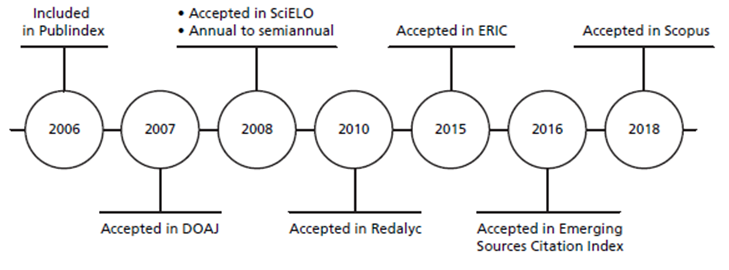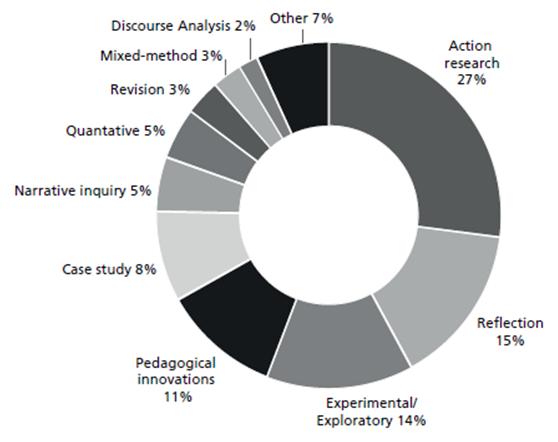In 2019, we completed 20 years of continuous publication of the Profile: Issues in Teachers’ Professional Development journal. With this first edition we feel more committed and happier to continue this publication effort. To carry on in this endeavor, we have reflected on the journey we have traveled and thus, wish to share with you what it has meant to us.
From its modest (although not unworthy) beginnings, the journal has gone through a series of transformations that are part and parcel of those long-term academic projects which, to adopt an ecological standpoint, are expected to evolve constantly; especially when their main activity is the construction of new knowledge. The journal was born out of a concern to make visible the research endeavors of a group of Colombian practitioners who taught English as a foreign language in primary and secondary schools and who participated in a teacher’s development program carried out at Universidad Nacional de Colombia in the latter part of the 20th century. The program focused on consolidating the identity of the teacher-researcher via the implementation of action-research as a way to question and transform particular problems that emerged in the English language classroom. The idea was to develop a sense of agency in teachers and thus make them aware of their capabilities to cause a “real impact” on their teaching practices to ultimately favor language learning in their students. A further consideration to achieve such aim was the creation of a venue for the practitioners to share their findings and to add to their teacher-researcher identity one fundamental dimension: academic publication. Since then, other cohorts of the teachers’ development program have emerged and the Profile journal established itself as the outlet for practitioners’ practices, knowledge, and professional development.
Eventually, the Profile journal’s somewhat localized focus grew, and we began to accept manuscripts from other teacher-researchers in and outside Colombia. Accordingly, the journal started to observe international standards for scientific publications and to take advantage of the technological tools available to reach a wider audience and accept a higher number of contributions. Thus, in 2008 the frequency of publication went from annual to semiannual and the electronic version of the journal was launched, making the adherence to the open access movement possible. At the same time, the journal was being submitted to and accepted by the most important databases and bibliographical indexes, something that attested the growing quality of the journal (the latest achievement in this regard was the inclusion in the Scopus database in 2018 [see Figure 1]).
The contents of the journal have also been diversified and we now accept, besides action-research, other research approaches and, basically, three types of documents: research articles, articles of revision, and reflections. These three kinds of articles characterize the sections of our publication.
The current issue marks the 34th edition of the Profile journal with a historical total of 406 articles published (an average of 11 articles per issue). If we continue this brief quantitative overview, we can see that we have 526 authors (some of whom have published more than once) who come from different countries and educational backgrounds (see Table 1).
Table 1 Distribution of Authors by Country of Origin and Educational Context
| Country of Origina | ||
|---|---|---|
| Colombia | 354 | |
| Mexico | 49 | |
| Chile | 32 | |
| Brazil and USA | 14 each | |
| Spain | 13 | |
| Turkey | 11 | |
| Iran | 10 | |
| India | 6 | |
| Argentina and United Kingdom | 5 each | |
| Italy and Cyprus | 3 each | |
| Australia and Slovakia | 2 each | |
| China, Portugal, and Ukraine | 1 each | |
| Educational Contexts | ||
| University | 408 | |
| Public schools | 93 | |
| Private schools | 14 | |
| Language institutes | 8 | |
| Offices of education | 3 | |
a n = 526
Finally, we can look at the percentages of types of articles published and their research approach. They are shown in Figure 2.
Along the road we have also faced challenges dealing with sustainability, recognition in national and international indexing systems, and authors’ preparations to comply with publication standards. The first one was overcome thanks to institutional policies established at our institution to ensure necessary sources to publish periodically. As far as indexation, in different editorials we have examined the tensions generated by policies that do not always recognize the efforts and nature of journals like ours. Although requirements to be accepted in well-known indexing systems and databases have not been modified and the Colombian national indexing system has ignored the claims of local communities, Profile has maintained its vision and mission as well as its strategies to ensure quality and inclusion of different teachers’ voices.
Despite the expected changes that come with the growth of our publication, one aspect remains constant: our aim of enriching the professional knowledge of our authors and readers and thus, create and strengthen an international academic community around the teaching and learning of English as a foreign/second language. As we have done so far, we will continue trying to keep abreast not only of the latest developments in English language research but also of the current guidelines and tools that will help to ensure the edition and publication of a top-quality journal. We certainly hope that, for the next 20 years, we will continue to be joined by our longtime readers and by new ones who will find the Profile journal a source of relevant information.
We have gathered twelve articles in this edition; five of them are authored by Colombian scholars, three are from Chilean researchers, two are from the Mexican context, one from Portugal and one from Spain. The first section, Issues from Teacher Researchers, includes seven articles; six concerning teacher education with two populations in mind: pre- and in-service teachers, and one related to EFL university students. In the second section, Issues from Novice Teacher Researchers, we include a paper by two researchers, a novice and an expert in an exploration about teaching contexts. The last section, Issues Based on Reflections and Innovations, contains four articles that discuss teacher education in specific contexts and areas of knowledge.
We open this issue with an article written by Mariza G. Méndez López from the Universidad Veracruzana, Veracruz, Mexico, which explores the emotions experienced by pre-service English language teachers during their teaching practicum and their effects on instructional teaching. The second article, authored by Mauricio Arcaya from Pontificia Universidad Católica de Chile, Santiago, Chile, deals with the topic of assessment of pronunciation evaluation. In it, the author explores the way in which native English teachers and their non-native Chilean counterparts assess pronunciation. The third article is a joint effort of two Chilean researchers, Eric Gómez Burgos and Soledad Sandoval Molina from Universidad San Sebastián, Puerto Montt, Chile, and Universidad de Los Lagos, Osorno, Chile, respectively. The researchers identified the attitudes towards English as a foreign language of 131 university students from different educational institutions in Chile. In fourth place, the Spanish researchers Amalia Herencia Grillo and Elena Hernández de la Torre from Universidad de Sevilla, Sevilla, Spain, discuss the training needs of local education professionals in Spain as agents of cultual facilitation. We continue with the article submitted by Luis Fernando Cuartas Álvarez from Universidad de Antioquia, Medellin, Colombia. In it, the researcher explores the creation of a route for teachers to collaboratively construct their understanding of intercultural communicative competence through their involvement in a study group. This is followed by a study presented by Eladio Donoso from Universidad Católica del Norte, Antofagasta, Chile. The purpose of this paper is to explore the perceptions of Chilean future teachers of English as a foreign language regarding the usage of Spanish in English lessons. The last article in this section comes from researchers Wilson Hernández Varona and Daniel Felipe Gutiérrez Álvarez representing Universidad Surcolombiana, Neiva, Colombia. The authors present a narrative inquiry on agency development in student-teachers of an English language teacher program.
The section Issues from Teachers Researchers features an article written in a joint effort by Tania Millán Librado and Nora M. Basurto Santos from Universidad Veracruzana, Veracruz, Mexico. The novice and the expert researchers investigated the perceptions of six English language teachers regarding their specific contexts.
The final section, Issues Based on Reflections and Innovations, starts with an article written by Flávia Vieira from the University of Minho, Braga, Portugal. The author examines how Language teacher education programs can promote autonomy-oriented change when they are based on a transformative rationale regarding learner and teacher development. This is followed by the reflection presented by Claudia Patricia Mesa Villa, John S. Gómez-Giraldo, and Rodolfo Arango Montes from Universidad de Antioquia, Medellín, Colombia. The authors concentrate their efforts on discussing a pedagogical experience in a research seedbed. Next, we find the paper authored by Ana Muñoz-Restrepo, Marta Ramirez, and Sandra Gaviria from Universidad EAFIT, Medellín, Colombia. The three researchers arrive to formulate a series of strategies for teachers to gradually lead students from an extrinsic motivation to a more internal and autonomous motivation. We finish our issue with the article written by Frank Giraldo from Universidad de Caldas, Manizales, Colombia, who discusses the language assessment literacy of the English language in the field of language testing.
To end, we wish to highlight the valuable contributions of the editorial committees, authors, readers, assistants to the editor, and Universidad Nacional de Colombia. All of them have provided their support in different moments and in different ways. This has proven worthy and encourages us to carry on.
















